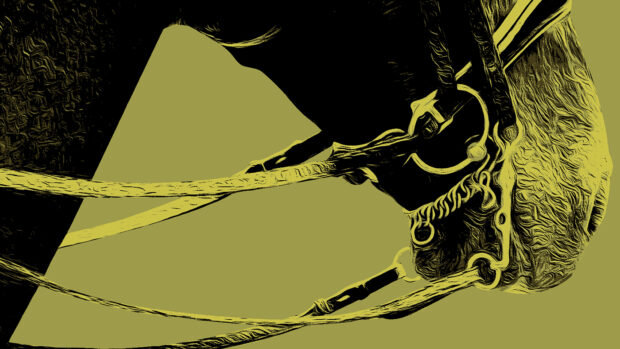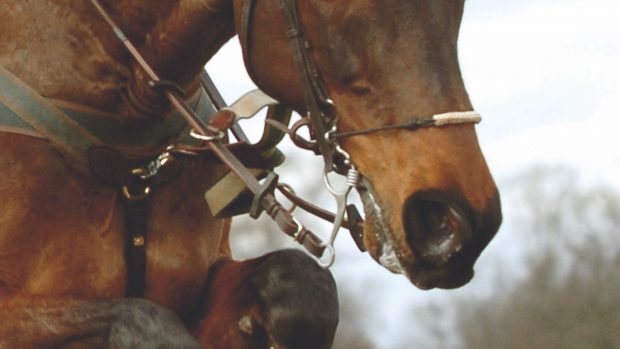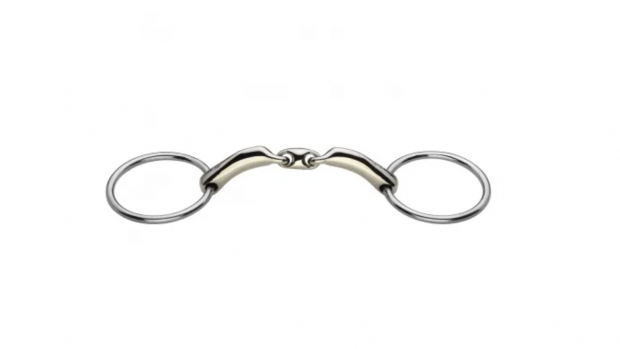If you’re considering a hanging cheek snaffle bit for your horse, then read a bitting expert’s view on how it works and what types of horse it best suits
How does a hanging cheek snaffle work?
“There is a lot of misinformation about the action of the hanging cheek,” says Horse Bit Hire’s Gail Johnson. “I do a lot of bit testing and fitting, and I’ve found that this type of bit doesn’t produce the poll pressure it is typically marketed to.
“The cheek pieces fasten onto the top loop and the reins onto the lower. When rein pressure is applied, the top part of the cheek tilts and the cheek pieces often become baggy and bulge away from the face, which raises the question — is any poll pressure being applied?”
Ema Odlin from The Horse Bit Shop agrees: “When you put pressure on a hanging cheek piece, the cheek pieces go loose so it’s impossible for it to put pressure down the bridle track over the poll because the cheek pieces are loose.”
Gail adds, “People often say that their horse won’t accept a hanging cheek due to the poll pressure — my thoughts are that not all horses are happy with a hanging cheek because of the increased central tongue pressure caused by the mouthpiece tilting when rein pressure is applied, or that the mouthpiece choice isn’t right.
“This type of bit cheek offers more stability than a loose ring and due to the action within the mouth, it generally offers more braking control than an eggbutt.”
Bitting expert, BETA field officer and lorinery consultant Tricia Nassau-Williams says: “Being a snaffle, it will act upon the horse’s lips, tongue and bars, generally encouraging an upwards action.”
What sort of horse does a hanging cheek bit suit?
“Horses can sometimes over-bend in this type of cheek, so I wouldn’t generally use this bit on a horse with a tendency to tuck behind the vertical,” says Gail.
Dressage rider and BHSII Stef Eardley says: “I would use this type of bit for a horse that is unstable in the contact as I find it to be a fairly fixed bit and so a fussy horse may settle well onto it.”
Ema adds: “When you put pressure on the rein, it lifts the bit in the mouth, which is why I find that the hanging cheek is better for sensitive horses who don’t like a lot of tongue pressure.”
Tricia says: “This bit is useful for horses that prefer mouthpieces supported off the tongue, and also for horses with a lower palate and those who benefit from the stability of the mouthpiece and side support from the cheeks.”
Hanging cheek bits
Shires Hanging Cheek Snaffles
Sizes: 4½–6in | RRP: From £20.99 |
The links in bold below will take you to the standard, single-jointed hanging cheek snaffle, but Shires also make…
- hanging cheek with a French link
- hanging cheek with a Waterford mouthpiece
- hanging cheek with a steel lozenge joint
- hanging cheek with a copper lozenge joint
- hanging cheek in sweet iron
- hanging cheek in brass with a brass lozenge
- hanging cheek in blue sweet iron with a brass lozenge
- hanging cheek with a rubber cover and peanut link
In the UK? View now at amazon.co.uk, viovet.co.uk, equus.co.uk, rideawaystore.com or naylors.com

Sprenger KK Ultra Baucher Bit
Sizes: 4½–5¾in | RRP: £200 |
In the UK? View now at viovet.co.uk or equus.co.uk
You might also like:

9 bits designed with young horses in mind

Choosing the right bit: would a Dutch gag suit my horse?

Eggbutt snaffle or loose ring: what’s the difference?
Snaffles are the most widely used bits on the market, but what is the difference between a loose ring and

Subscribe to Horse & Hound magazine today – and enjoy unlimited website access all year round
Horse & Hound magazine, out every Thursday, is packed with all the latest news and reports, as well as interviews, specials, nostalgia, vet and training advice. Find how you can enjoy the magazine delivered to your door every week, plus options to upgrade your subscription to access our online service that brings you breaking news and reports as well as other benefits.







